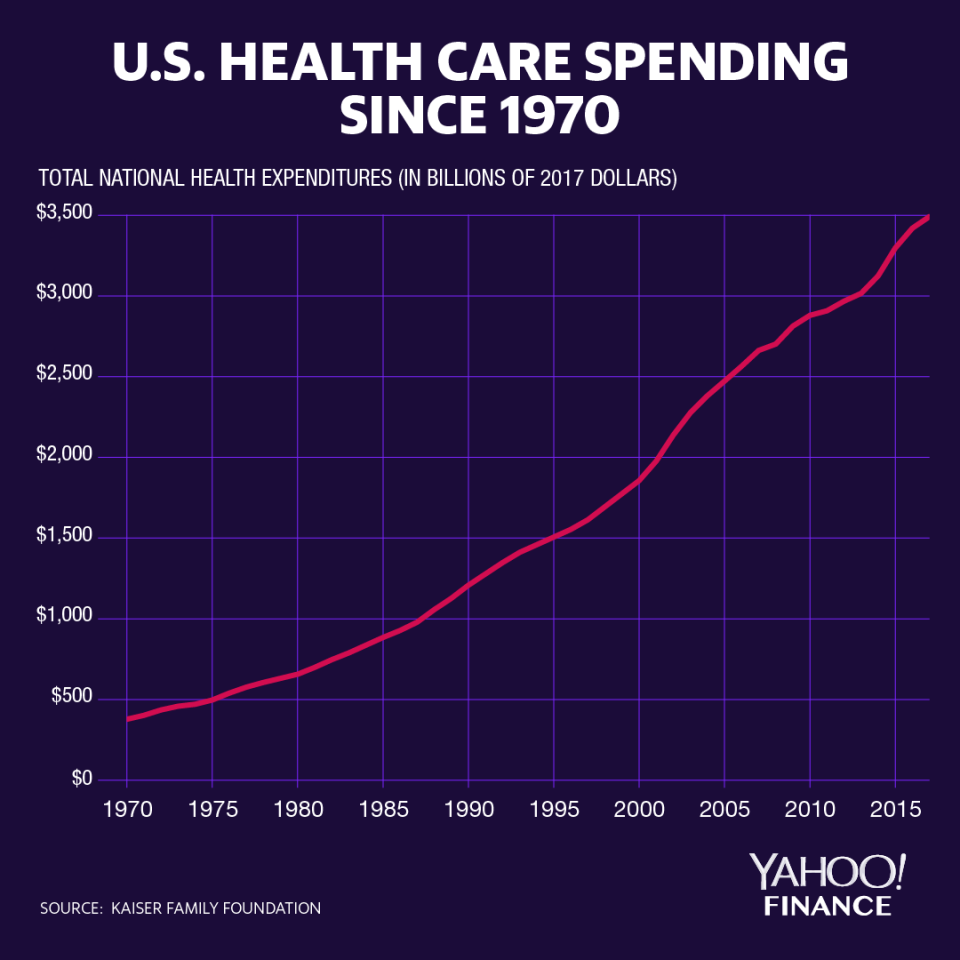Why health care costs may never go down
Most things get cheaper and better over time: smartphones, cars, appliances, food. So why is health care such a glaring exception?
The Affordable Care Act, which Congress passed in 2010, expanded health care coverage to nearly 20 million Americans. But it was misnamed, because it didn’t make health care more affordable for most people. “Where we got it wrong is that we passed on too much cost to working Americans,” Bernard Tyson, CEO of health provider Kaiser Permanente, said at the Yahoo Finance All-Markets Summit on Oct. 10. “So you end up getting, an ‘affordable premium,’ but when you go in for care you discover you have a $1,000 deductible or a $5,000 deductible.”
Major health care advances are likely during the next decade, as new treatments such as gene therapy become more prevalent and technology helps many patients get better care. But don’t expect the overall cost of health care to fall. Some things may get cheaper, such as routine doctor visits and some procedures. But new therapies will be expensive, driving up overall costs, and some elements of the health care economy are impervious to competition, which keeps costs high.
“You have a combination of two things happening,” Tyson said. “You have a system that is becoming more efficient and effective. And then you also have an industry that is evolving in ways that none of us ever imagined. The challenge with that is the affordability issue.”
Health care costs aren’t rising as much as they used to be, but they’re still going up by more than inflation. The cost of a family insurance plan rose 5% this year, to an average of $20,576, according to the Kaiser Family Foundation. Overall inflation is just 2%. Individuals pay more than $6,000 of that cost, with employers paying the rest. Deductibles and other out-of-pocket expenses have been rising, too.

Health-care analyst Steve van Kuiken of McKinsey points out that 60% of all health care costs are “unshoppable,” which means patients don’t have a realistic way of comparing prices or quality, in order to get the best deal. You can’t price-shop in the emergency room, for example, or request a less expensive IV bag. “It has not been a consumer-oriented industry at all,” van Kuiken said at the summit. “Accessing the health care system is extremely hard.”
Some forthcoming changes could make managing and shopping for health care easier. Tech giants have been dabbling in health care for years, mostly testing the waters with small pilot projects on patient data, health monitoring, medication reminders and other things. Now, van Kuiken says, “Amazon, Apple, Google and Microsoft are getting in in a big way. They’re going to start to build platforms that allow these models to scale.”
Several Democratic presidential candidates favor a single-payer government plant that would essentially eliminate insurers such as Kaiser. Tyson, not surprisingly, thinks that’s the wrong way to go. He points out that 90% of Americans already have coverage in one form or another. “Do we continue to focus only on coverage?” he asks. “Or do we really start to look at what the cost of care is and how we can deal with the inefficiencies of care? I’m more worried about that.”
Rick Newman is the author of four books, including “Rebounders: How Winners Pivot from Setback to Success.” Follow him on Twitter: @rickjnewman. Confidential tip line: rickjnewman@yahoo.com. Encrypted communication available. Click here to get Rick’s stories by email.
Read more:
Why Trump’s tax returns still matter
Markets would soar, not sink, if Trump left office
Trump’s trade war has killed 300,000 jobs
The Bernie Sanders billionaire-eradication plan
4 problems with Andrew Yang’s free money drop
Read the latest financial and business news from Yahoo Finance
Follow Yahoo Finance on Twitter, Facebook, Instagram, Flipboard, SmartNews, LinkedIn, YouTube, and reddit.
